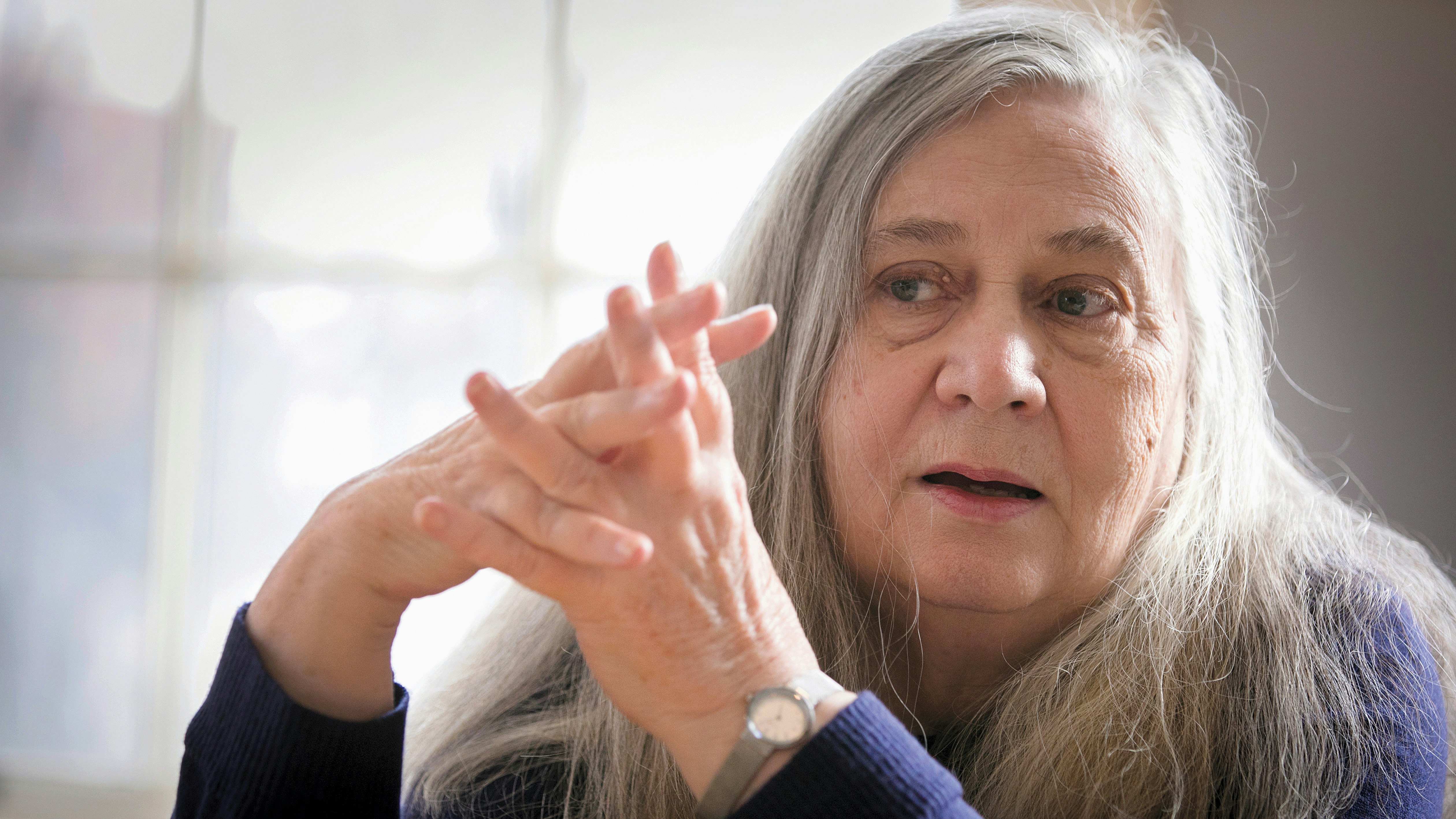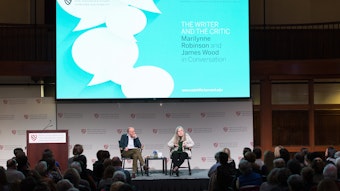Marilynne Robinson Is Fully Present

Throughout her career, Marilynne Robinson has earned a number of honors and awards. More important to Robinson, however, is the opportunity to explore life's most difficult questions—a challenge she takes on in all of her writing.
It might seem oddly contradictory that in a time of rapidly proliferating truths, untruths, and “fake news,” the world of fiction has the power to ground us in reality. Yet now, more than ever, made-up stories have the heft of truth, providing the emotional and intellectual sustenance we crave. That realization feels particularly apt when considering the power of works by the Pulitzer Prize–winning writer Marilynne Robinson. The author of Housekeeping (Farrar, Straus and Giroux, 1980), Gilead (Farrar, Straus and Giroux, 2004), Home (Farrar, Straus and Giroux, 2008), and Lila (Farrar, Straus and Giroux, 2014), Robinson, 74, trails a long list of honors and awards wherever she goes; the fact of that critical success and her many, many fans (including President Barack Obama—more on that later) can be somewhat intimidating.
What becomes clear in talking to her, however, is that while she is appreciative of these accolades, Robinson—a professor emeritus at the University of Iowa and a visiting scholar at Radcliffe in the spring—is far more interested in exploring life’s big questions. The scope of that ambition shows up in the titles of essay collections such as The Givenness of Things (Farrar, Straus and Giroux, 2015) and What Are We Doing Here? (Farrar, Straus and Giroux, 2018) but is also apparent in the tangible, fully realized lives of characters such as Sylvie, the unconventional, nomadic aunt of Housekeeping, and John Ames, the elderly minister of Gilead, who finds a late second love in Lila, an itinerant worker with a difficult past. Understated and incisive, Robinson’s fiction is stripped down, yet somehow generous—all words that also describe what she’s like in conversation.
Robinson grew up in Sandpoint, Idaho, a town in the state’s panhandle flanked by water and wilderness. She’ll tell you that her childhood was really very pleasant. She read what she wanted and was free to wander and “look at things”—probably one of her favorite pastimes both then and now. In childhood, she became aware of alternate societies, embodied by hermits living in the mountains, vagrants who rode the boxcars passing through town, and men who lived in the “Skid Row” area of Spokane, where Robinson’s family ran big-city errands. She remembers, on one such visit, a man: young, nice looking, and dressed in a weather-beaten suit. Robinson stared at him through the car window. “And he looked at me, as if to say, what are you looking at?” she says. “He was an interesting type who I photographed in my mind and returned to many times. A strange but important memory.”
That seminal experience ties into the themes of Housekeeping, a novel populated by characters who live outside conventional norms. Robinson wrote it as a PhD student, while on a teaching exchange in France. With the university on strike, she essentially shut herself in a dark room in her rented house and “plunged” around in her thoughts, “trying to remember Idaho, where I hadn’t lived for 17 years.” In the end, she had a manuscript; she sent it to a friend, who (unbeknownst to her) sent it to his agent, who saw that it was published. For Robinson, it was an unexpected but pleasant turn of events that she accepts with a shrug and a frequent refrain: “What can I say? It’s always surprising.”
Low-key, Robinson nevertheless gives the impression of someone who is fully present. Words—what we say to each other—matter. Sitting quietly at a Fay House conference table, her large, gray-blue eyes unwavering, she gamely answers questions about why she’s a Congregationalist (“It’s very democratic, and that appealed to me”), her preferred translation of the Bible for everyday use (the Revised Standard Version), and the books of the Bible she returns to again and again (there are many, including Job, Romans, Corinthians, James, and Ruth, but she mentions Isaiah first—“It has beautiful, beautiful visions of reconciliation”). You might also find Robinson reading about quantum entanglements in Scientific American, an experience she likens to reading the Psalms. “I love these beautiful hypotheses about the beginnings of things, the configuration of the universe,” she says. “It rearranges your notion of existence.”
Being publicly identified as religious is uncommon enough in today’s world that students at Iowa of all faiths and nationalities sought her out when they felt misunderstood, she says. “They knew that I’d understand them because I’m religious, not because my religion on paper resembled theirs,” she explains. “Human beings do a lot of very self-defeating things, but there is nothing worse now than the tendency to create this idea around entrenched difference between one religion and another, when in fact religion is something that really does embrace a million variations.”
Having taught at the Iowa Writers’ Workshop for 25 years, Robinson is heartened by a relatively recent increase in the program’s diversity. “It makes the whole atmosphere of the place more attentive to what life is made of,” she says. “There’s a vitality and even an honesty in the writing. It’s less mannered and more focused on the physicality, the particularities of the world.” Which are the hallmarks, she argues, of good fiction.
In the 24 years between Housekeeping’s publication and Gilead’s, Robinson read, and read widely—fiction, of course (she refers to 19th-century writers as “my darlings” and has taught Moby Dick multiple times), but also everything from Karl Marx to Adam Smith to the Old Testament. The books of Genesis and Exodus, in fact, happen to be her current focus for the Hulsean Lectures, a series of eight talks given throughout the year at Cambridge University’s Faculty of Divinity. She plans to expand the scope of the lectures for a book that will give readers an appreciation for the Old Testament as an approachable, coherent body of literature. She is also at work on her next novel, briefly described as “another turn of the question” in the sense that it, too, will be part of the world she has created around Gilead, Iowa.
Robinson is so well known for her deeply philosophical, thoughtful essays and fearlessness when taking on life’s big, difficult questions that it can be easy to neglect more-prosaic questions about how she goes about daily life. Gardening, for example, is in her blood—her parents gardened, as did her grandfather, and when her schedule settles down, she would like to do more of it. She writes in long-hand and then types out what she has written, revises on the page, and retypes multiple drafts along the way to a finished manuscript. For news, Robinson watches CNN and reads the New York Times, the Washington Post, and the Wall Street Journal. The Journal, she adds, is “Republican by instinct,” but when its reporters uncover something salient, it has an added authority for just that reason.
Now, about Barack Obama: The former president began reading Gilead between campaign stops in Iowa; he awarded Robinson the 2012 National Humanities Medal, interviewed her for the New York Review of Books, and recorded a video tribute when she retired from Iowa in 2016, exchanging handwritten letters with her along the way. Two years later, the political landscape looks a bit different. But cynicism in the face of current events is damaging and “very easy—one solution to every question,” Robinson says. “There’s enough cynicism in the culture that you can learn mild contempt for anyone whose biography you read. People don’t matter because they have ordinary vices; they matter because they have very distinctive gifts or virtues.”
Robinson is struck, however, by the institutional instability and general erosion of democratic authority cropping up in some European countries—a trend that many would say is echoed in the United States. Whatever the headlines may bring, however, she is heartened by the courage and activism shown by students in the aftermath of the mass shooting at Florida’s Marjory Stoneman Douglas High School. “If we took them as they present themselves, we would say their public education is splendid, that they have a kind of moral solvency that we are always so reluctant to grant to a younger generation.”
“We’d better be the hope for the future,” Robinson adds firmly. “This is a country that has tremendous strength and resilience...We need to be the source of optimism.”
Differing Worldviews Lead to Spirited Discussion
In April, Marilynne Robinson head-lined the Julia S. Phelps Annual Lecture in the Arts and Humanities at the Knafel Center, appearing in conversation with James Wood, a Harvard professor of the practice of literary criticism and a staff writer at the New Yorker. Their differing worldviews—Wood is the author of The Book Against God (Farrar, Straus and Giroux, 2003)—led to a spirited, often humorous discussion.
Noting the themes of resurrection in Robinson’s work, Wood, the son of a minister, confessed that he, too, is “fairly obsessed” with the idea: “The problem is that I can’t believe it.”
“I think of people as being much too profound, much too complex, much too open to the extremes of experience to simply live four score years and die,” Robinson responded. “On humanist grounds, it seems inevitable to think there’s more to us than perishes in this world.”
The tension between belief and disbelief led naturally to the topic of doubt, which Robinson said she’d always considered to be a dialectic with faith. “That’s what Cal-vin says,” she remarked, citing the French theologian and Protestant reformer. “You slip back because your assumptions are too narrow; being instructed by doubt, you make another experiment with belief.” But she hasn’t doubted in a while, she added, reflecting that her life’s path has been completely unanticipated. “I feel like I know what I want to do, which I consider to be a great blessing,” Robinson said. “So long as my faculties hold together, I will do that. I’m amazed at the opportunity.”
Julia Hanna is an associate editor at the Harvard Business School Bulletin.








